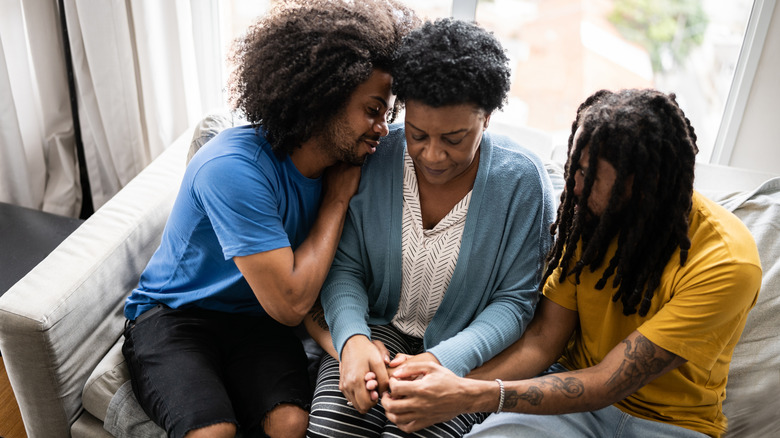Why It's So Important To Confront The Men In Your Life About Their Problematic Faves
As the fourth-wave of feminism has taken hold and more women are demanding social change, there has been an angry response from some men who have spoken up about women not bowing down to their expectations. One of these people who has made headlines time and again with his misogynistic, homophobic, and abusive actions, is Andrew Tate.
Although Tate originally made a name for himself as a kickboxer, it was his hate speech and violent behavior, most notably against women, that brought him recognition. Not only is Tate someone who spews such rhetoric that women are responsible for their own rape and teaches men how to violently control their female partners, he also has legions of male fans. So many, in fact, that a YouGov poll found that about a quarter of men support Tate's views of women and three in 10 men agreed with Tate's assessment of what it means to be a man (which is the definition of toxic masculinity), via The Independent.
Unfortunately, Tate isn't the only one. We live in an era where any white supremacist, misogynistic, homophobic person can have a platform to preach their hateful ideology and if it's loud enough, the followers will come running. If a man in your life — your partner, brother, dad, friend — or any other man you care about has fallen down the rabbit hole of supporting problematic men like Tate, you need to confront them on it. You can't just stand by and hope it's a passing phase.
Why you should speak up
We're living in very polarizing times. The U.S. is divided like it hasn't been in many years and extremism, on all fronts, is off the charts. When Trump announced his run for office, many thought it was something that could never happen. But as Election Day 2016 arrived, things began to unfold. Like Tate, Trump's conduct and his beliefs are the antitheses of what an evolved society looks like. As we've seen with these two men, as well as with the Proud Boys and many others, there's been a trend of males becoming radicalized by people whom they see as their leaders; leaders who know exactly what they're selling: hate. While it's nice to think such radicalized thinking can only exist in a vacuum with a few unreasonably enraged men, that's not the case. Instead, this thinking preys upon the fear that white men are being kept down by women and other minority groups, and it spreads like wildfire.
Then it's no longer a little group over there or over here, but a conglomerate with many people who share a dangerous ideology that can become deadly. If women, Black people, and members of the LGBTQAI+ community are not seen as human, it affects society as a whole. It creeps into conversations and gets people wondering if there's some truth to what's being said. It starts normalizing white nationalism, homophobia, and misogyny — a road you don't want any man you care about to go down.
How to do it
When dealing with someone who's started to take these problematic beliefs to heart, the first thing you want to do is ask yourself why they might have been vulnerable to such rhetoric. Did something happen in their life that triggered this? A bad breakup? An absent mother? Granted, neither are reasons for anyone to align their thinking with such hatred, but it's important to open a dialogue to see if you can pinpoint what could have created such a negative impact.
"The person in question may be manifesting a more significant, profound issue," psychologist, psychotherapist, and clinical trauma specialist Robert Common told Glamour. "This could be a traumatic experience, a lack of belonging, or a sense of insecurity — any kind of vulnerability increases the chance of being radicalized in one form or another... Regardless of your political or social leanings, you should listen and engage with those whose views you find challenging — if you don't, you risk marginalizing them further and pushing them to greater extremes."
While you may not be able to change their mind, you can at least plant the seed. Perhaps, the men in your life — due to trauma or specific events — are vulnerable to hate speech and they just need someone to offer the other side of things. Don't expect every man you know who's gotten on the problematic men train to come back 100%, but if you can catch a few just in time, then that's something.


